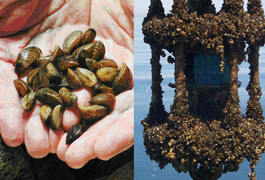home | metro santa cruz index | news | santa cruz | news article

Gang Activity: Tiny zebra mussels have been known to clog massive pipes in the Great Lakes and other infected waterways, causing hundreds of millions of dollars in damage.
Serious Shell Game
Watsonville struggles to keep a pernicious aquatic invader at bay.
By Jessica Lussenhop
On a winter morning on Pinto Lake, it's so cold that a ghostly snowstorm is visible at the summit of the Santa Cruz Mountains. Despite the temperature, Robert Ketley, a senior utility engineer for Watsonville, strides down the thin, rocking pier and sticks his hand into the frigid water. He brings up a 12-inch piece of pipe tied with a string to the dock. "They like to settle on dark surfaces," he says, sliding his index finger along the inside. He triumphantly produces a dark green film. "Slimy. Slimy is good."
The pipe is a primitive detector of a tiny but fearsome adversary: the zebra mussel. The tiny mollusks, which as adults are not much larger than a fingernail, are so voracious that a few square inches of free space is all the opportunity they need. Each month, when Ketley pulls the pipe up out of the lake, he's hoping not to find it the texture of sandpaper, which would mean it was too late. In two years' time zebra mussels can completely decimate a lake's ecosystem, and neither their natural predators nor human intervention can keep their numbers in check. Pinto would be closed immediately by the state so as not to spread the mussels to other waterways. And its ecosystem would change irrevocably.
"This lake is a tremendous natural resource," Ketley says. "You can't lose that without a fight."
Pinto Lake is called a "sag lake," a term that refers to the sagging of the land after movement by the Zayante fault some 8,000 years ago. That means it's an all-natural lake rather than a reservoir, a rarity in these parts. It's become a stop on the Pacific migration route for wild fowl, a favorite of local fishermen and host to the Santa Cruz Yacht Club's El Toro program, which offers free sailing lessons to kids ages 8 to 14. Invading zebra mussels could decimate the bottom of the food chain, breed by the thousands, damage boats and promote the proliferation of a type of botulism deadly to water fowl.
"For a tiny little organism, it packs quite a punch," says Ketley. "The ecosystem will collapse."
The first zebra mussel in California was found a year ago in San Justo Reservoir, about 30 miles away. Though the reservoir was quarantined, the California Department of Fish and Game and the Watsonville Parks Department fear Pinto Lake will be next. "We're one step away from the edge of a cliff," says Ketley.
The initial solution was to close the lake for winter, until El Toro, which runs its sailing program from October to March, was told it would have to close. Paul Tara, program director, says Pinto is the only public lake in the county suitable for teaching sailing. "I don't really know of any other possibilities," says Tara. "But the city of Watsonville and the staff on Pinto Lake have been really cooperative."
In an effort to keep the lake open, the parties hatched an inspection plan. "We put our heads together to figure an approach out," says Ketley. To sail Pinto, boat owners need to show an unbreakable tag attaching their vessel to its trailer hitch. The tag, administered by Pinto staff during a two-week period in November, is snipped by lake staff when boaters enter the park and reattached when they leave, committing them to boating exclusively on Pinto.
But earning the tag can be tricky. Because the mussel larvae can survive in a single droplet of water, the boats must be bone-dry at inspection. Not even floor mats can be damp. Bilges, live wells or plumbed systems of any kind are now banned, as is live bait. Because there is no extra staff or money to conduct regular inspections, new boats cannot enter Pinto until March 1, when a limited inspection schedule will begin. Currently, Loch Lomond, which has been consulting with Watsonville staff, has a $50,000-a-year inspection program, money that may be out of the city's reach in the current economic crisis.
Though the inspection and tagging system is primitive, Ketley has been pleased with the amount of cooperation from locals. But he stresses that keeping people informed is vital, since the mussels spread so easily. "It's up to the community," says Ketley. "It only takes one person."
That's not an idle warning. It could take just one absent-minded boater with a damp fishing lure or lifejacket to introduce the mussel. And there are things too small for an unbreakable tie to secure. Lake-goers will have to police themselves when it comes to things like small row boats, kayaks, wader boots or anything else that could potentially transport water from an infected body of water. Though the inspections and restrictions may be irritating, this has become a classic "one bad apple spoils the barrel" situation.
Watsonville Parks director Ana Espinoza says she hopes the community will care enough to pitch in. "People really want to help us on a personal level," she says. "I spoke to some men who are retired and come here to fish. They told me, 'This is all we have to look forward to.' It's their main source of happiness."
Send a letter to the editor about this story.
|
|
|
|
|
|